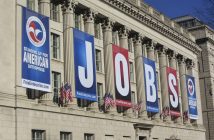A new report paints a disturbing picture of native-born African-Americans systematically passed over for manual labor jobs in favor of Hispanic immigrants, legal and illegal. Following are a few egregious cases from the prosecution files of the U.S. Equal Employment Opportunity Commission (EEOC):
- A staffing company at a Memphis, Tenn., warehouse favored Hispanic workers over African-Americans. Job seekers lined up outside the warehouse each day, but managers would select Hispanics over blacks, even when black workers were experienced and farther ahead in line. Managers would announce in English there were no more positions. After African-Americans left, Hispanic workers got to work.
- New management at a hotel in Alexandria, Va., systematically replaced black housekeepers with Hispanic workers. When workers were told they must re-apply for their positions, blacks with years of experience and satisfactory performance were rejected. Hispanic workers were hired in their place.
- EEOC sued the owners of an Indianapolis hotel where the general manager said she wanted to “get ‘Mexicans’ in who would clean better and complain less than the black housekeeping staff.”
- A grower in Georgia retained Mexican migrants after initially hiring Americans. Shortly after each harvest began, most of the Americans would be summarily discharged. According to the EEOC, a manager told a group of 80 who were dismissed, “All you black American people, f*ck you all.”
Acknowledging prevailing stereotypes of native-born workers lacking reliable work habits or suffering from substance addictions, report author Jason Richwine said, “We have to stop using immigration as a crutch.”
“Helping downtrodden Americans become productive citizens is a serious challenge, but further devaluing their labor by importing more foreign workers is the worst way to go about it,” he asserts.
Unfortunately, the Trump administration went the other way this year when it announced issuance of an additional 30,000 low-skill (H-2B) work visas – doubling last year’s total. Meantime, the arrest of 680 illegal workers at Mississippi food processing plants this summer shined a light on the prevalence and exploitation of illegal aliens in the labor force.
Peter Kirsanow, a member of the U.S. Commission on Civil Rights, estimates that reliance on unskilled foreign labor translates into 1 million fewer jobs for African-Americans. In 2016, he testified before Congress about the particularly corrosive effects of illegal aliens in the workplace.
“The data do not show that [foreign laborers]do jobs that native-born workers won’t do,” Kirsanow stated. “But those [immigrant]workers won’t complain. They’ll accept lower pay and poorer working conditions.”
Kirsanow repeatedly shared his concerns with the Congressional Black Caucus, to no avail. “All we heard were crickets. On a political level there doesn’t seem to be a whole lot of energy on this issue.”
Though the economy is up and unemployment rates are down, he cautions, “Everything is cyclical. Those who are harmed by an influx of low-skilled, low-wage labor are going to be Americans in that same category [of disadvantaged workers].”
Envisioning a workplace where the surge of low-skill foreign labor is stanched, Richwine says, “Employers would have to appeal more directly to natives. They would have to raise wages and look at working conditions. Ultimately, we must integrate low-skill natives not just into the labor force, but into civil society.”





1 Comment
Pingback: Employment Commission Finds African-Americans Passed Over in Favor of Hispanic Immigrant Workers – The Importance of Business